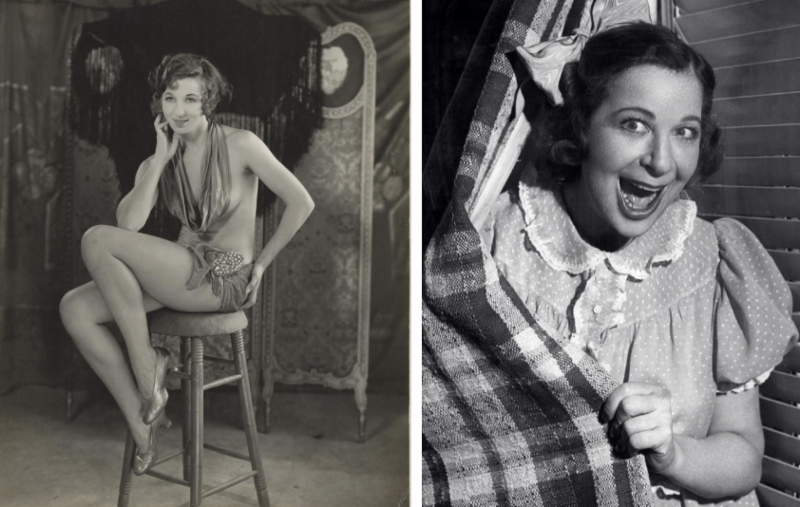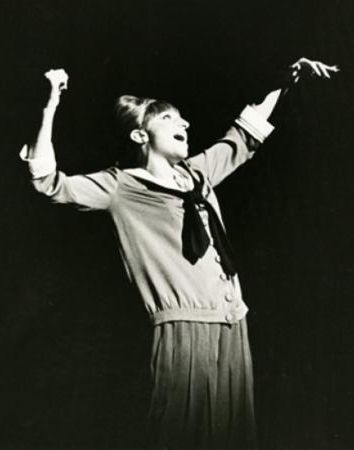"I want to give the audiences a wall of sound unlike anything they have heard!"
Brian Kelly has big plans for kicking off the Concord Players' 100th season. He'll be directing Funny Girl,
a 1964 musical about the life of singer, comedian, Vaudeville star and
movie actor Fanny Brice. It's the show that launched Barbra Streisand's
career, catapulting her to stardom and introducing a new generation to
Brice's comedic genius and the influence of Vaudeville on American
musical comedy.
Born Fania Borach on
October 29, 1891, Brice was the child of Jewish immigrants who settled
on New York's Lower East Side. Her appetite for show business was
whetted by her success in local talent shows in Brooklyn. Determined to
have a career as an actress, she performed in Vaudeville and Burlesque,
often taking roles that didn't suit her talents, but kept her in front
of an audience. It took a few tries, but she found success in Florenz
Ziegfield's Follies, carving out a space for herself with comedy
as a counterpoint to his long-limbed, blonde, be-sequined beauties.
Later, she revealed the depth of her talent as a chanteuse with a
performance of My Man. Standing completely still in the middle of
the stage with no affect and no accent, she passionately intoned the
enduring lament of a woman's unrequited love, a lament that she herself
was living. The song became her signature and audiences thereafter
clamored to hear her sing it.
Loud, brassy,
hard-working and tough, Brice ascended to stardom not through her songs,
however, but through her comedy. Capitalizing on the popular trend for
ethnic humor at the beginning of the 20th century, she developed skits in a Yiddish accent, doing "Jewish Jokes" and parodying stereotypes.
Later, in response to
growing anti-Semitic sentiments she dropped her accent and rose to radio
stardom by reprising a Vaudeville character of her own making, Baby
Snooks. Her persona as Snooks soon blossomed into a full-hour radio
show, providing Brice with fame and income for more than a decade.

Brice's producer
son-in-law Ray Stark thought the tumultuous, rugged roads she traveled
to achieve success was a story worth telling. He encountered some rugged
terrain of his own being turned down by a series of lyricists,
composers, choreographers and actors not interested in doing the show
until he found success with composer Jule Styne and lyricist Bob
Merrill. Success was guaranteed with the casting of young Barbra
Streisand in the leading role of Fanny. Not-too-pretty, very Jewish, a
little brash and extremely funny, Streisand embodied Brice's essence.
She brought her instinct for comedy and her transcendent voice to the
part, giving herself and the play a prominent place in in the canon of
American musicals.

The plot of Funny Girl
centers around Fanny's marriage to entrepreneur and gambler Nicky
Arnstein. There's an almost tragic irony in Brice's marriage to
Arnstein. He was an embezzler, an addicted gambler, a crook and a
philanderer. Brice's own father lost the family business through
gambling debts, leaving her mother alone to provide for her family.
Brice met the same fate after Arnstein's second imprisonment for wire
fraud and his profligate spending of her money.
Despite the despicable Arnstein, Funny Girl is a show of determined optimism and aspirational energy, just like Fanny Brice.
"Funny Girl is one of
the great classic musicals of our time," says director Kelly. It is a
biopic in its truest sense. In addition to being a wonderful show with
iconic music, it takes us back to a time when the American musical
theater was coming into being as the art form we know today."
He says this show is
particularly relevant for Concord Players as the Players has its origins
in the early 1900s and has quite literally grown up with the American
theater. "We could not ask for a more historically appropriate piece to
kick off the 100th season."
Kelly hopes for a big turnout at tryouts because this show is, as he sees it, all about the ensemble. "Most people know Funny Girl
as being a lead vehicle show -- it's all about Fanny, but in particular
the ensemble is going to truly bring this show to life," he tells us.
"I think we often forget that people are made recognizable because of
the people around them. Who we interact with in life helps to create and
tell the story of who we become. I want to make sure that we create the
entire story of Fanny's life not just a singular snapshot of the person
she was."
The show is colored
with the world of Vaudeville which was an era of ensembles, shtick and
zany humor; actors riffing off each other, the comic, the straight man,
the buffoon. Kelly plans to recreate the world that Fanny lived in as
accurately as he can, and he'll need a strong ensemble to make that
happen.
It's no surprise the
Players will be mounting a major production rarely staged by regional or
community theaters. In 2010, the group staged a production of The Scarlet Pimpernel,
a play so technically complex and difficult, few professional theaters
even try to put it on the boards. The combined genius of set designer
Brian Harris and builder/engineer Allen Bantly resulted in some
show-stopping moments of technical wizardry: a boat that miraculously
appeared up out of the floor in a cloud of mist, for example. A cast of
rock-stars combined with a crew who never slept made for one of the
Players' most memorable and successful productions.
With Kelly at the helm and a virtuoso production team, the Players are undaunted despite the challenges that Funny Girl
presents. One New York Times reviewer said this about a recent Paper
Mill Playhouse production of the show: What makes it all the more
impressive is that few actors, or theater companies outside of summer
stock, dare to attempt Jule Styne's and Bob Merrill's grand spectacle
that propelled Barbra Streisand's career nearly 40 years ago."
We're not scared. Oh, and did we mention the 22 piece orchestra? So come be part of Concord Players' history and try out for Funny Girl!